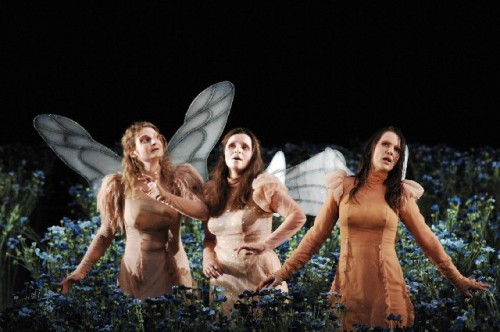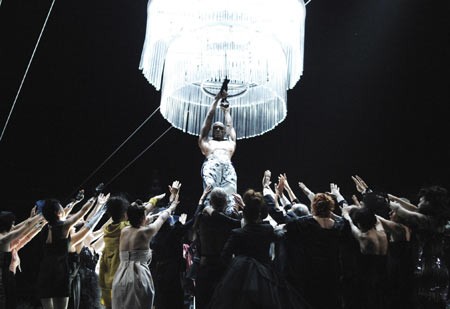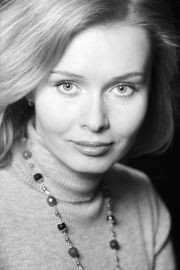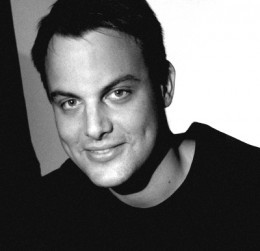A Sprightly Rusalka in Zurich
Attention Must be Paid: Ekaterina Scherbachenko, Pavel Cernoch
By: Susan Hall - Jun 13, 2013
Rusalka
by Antonín DvoÅ™ák
Libretto by Jaroslav Kvapil
Conductor Eivind Gullberg Jensen
Opernhaus Zurich
Zurich, Switzerland
June 12, 2013
Matthias Hartmann (Producer), Karl-Ernst Herrmann (Stage Design), Victoria Behr (Costumes), Ismael Ivo (Choreography), Martin Genhardt (Lighting), Michael Küster (Dramaturgy)
Rusalka Ekaterina Scherbachenko
Prinz Pavel ÄŒernoch
Jezibaba Liliana Nikiteanu
Fremde Fürstin Michelle Breedt
Wassermann Christof Fischesser
Erste Waldelfe Ivana Rusko
Zweite Waldelfe Julia Riley
Dritte Waldelfe Judith Schmid
Heger Dmitry Ivanchey
Küchenjunge Rebeca Olvera
Jäger Tomasz Slawinski
The architects of the Opernhaus Zurich had already designed an opera house just like it in Brno, Czechoslovakia. It does not surprise that the Zurich Opera has mounted an impeccable and moving production of Czech composer DvoÅ™ák's great opera, Rusalka.
The libretto’s poetry inspired DvoÅ™ák. In Rusalka the music matches not only the text but the feeling perfectly. The through-composed score combines the musical complexity and beauty of Wagner, with the lyricism of a Puccini.
Renee Fleming was known for her Rusalka and in time Ekaterina Scherbachenko should be as well. Winner of the BBC Cardiff Singer of the World Award in 2009, Scherbachenko resonates with both strength and fragility. Her middle voice is extremely beautiful and her effect is large in the Zurich house. She is a graceful performer with fine phrasing. Her top wobbled a bit as she started, but when she settled in she seemed made for the title role.
She can take on the entire orchesra and whisper too, with her voice as soft as the mist or the dancing fairy figures and whispy white mists bouncing on the reeds of her marshland home.
As a human Rusalka is mute and Scherbachenko meets the challenge of a voiceless singer, moving to DvoÅ™ák's musical rendition of her character as the Prince sings with her underscored themes in the orchestra. Together they produce insightful poetric expression.
Czech tenor Pavel ÄŒernoch makes his Zurich role debut as the Prince. Full of the ardor of youth, and irresistible in both his acting and singing, he moves credibly through his initial passion to defection to the Foreign Princess and then his final madness. His phrasing is impeccable and his warm, rich voice convinces. He can be both delicate and forceful with seeming ease. His elegant lines and brilliant high notes are tender of tone, and his voice has the hint of a sob in the voice as he robustly swings one phrase into another.
The three wood-sprites are delightful. Christof Fischesser sings the Water Gnome, father of Rusalka, meshing Alberich and Wotan in a touching performance.
The kitchen help is daringly presented in contemporary dress to match the mega city flickering in the background of the mysterious marshland which holds eternal mysteries. When Rusalka wants to watch the worldly castle proceedings she tucks herself out of sight behind the prompter’s box.
Jezababa is camped up with perfect timing and lack of taste by Liliana Nickitain. The South African mezzo Michelle Breed struttered her vocal stuff to attract the Prince and then spit him out. She blazed with just the right vocal tone and a haughty disdain for her cold rival. All heat in her. No wonder the Prince succombs.
The conductor Eivind Gullberg Jensen brought forward the color and nuance of this delicious score, which combines Wagnerian richness and the strains of native folk-dance with impressionistic passages. Jensen caught DvoÅ™ák's twists and turns, from dance sections, to the comedy of the gamekeeper and turnspit. In the pictures of forest, the orchestra shimmered. The woodwinds were noteworthy throughout the evening, and the harp and clarinet superb as the water themes and Rusalka’s.
The staging is a provocative combination of the real fairytale marshes that border on modern metropolises. Projected in the background, and then brought forward before the curtain for kitchen scenes, and in the second act scenes in the castle, the modern world is not as inviting as the backwaters of of the marsh which are finally desecrated by Rusalka’s unfortunate return from the human world at the opera's end.
Joy momentarily returns as Rusalka pauses to bless the prince’s soul before she sinks back into the lake: soft strings, blunted brass and a final arpreggio conclude a breathtaking evening of opera. DvoÅ™ák's take on the human condition is both vivid, and profoundly disturbing.





